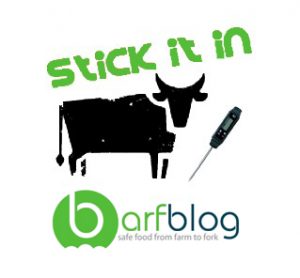Me and Ben, my hetero lifemate, broke up.
 He was worried about a blog post I wrote, with university types to answer to, I disagreed, so the barfblog.com is now totally mine.
He was worried about a blog post I wrote, with university types to answer to, I disagreed, so the barfblog.com is now totally mine.
It’s expensive for an unemployed ex-prof, but I understand.
Ben can still post when he likes, but it’s about 5 per cent of the content.
And the offending post will soon be up again, and if someone wants to sue, go ahead.
I know what happened.
Sometime in 2004 I went to the Gold Coast in Australia with my soon-to-be-stalker girlfriend.
I went on one of the morning shows, and was going to talk about the importance of thermometers, and the government food agency type said, you can’t do that, Australians just use their fridges to keep beer cold.
The chef at the restaurant we filmed the piece in had a tip-sensitive digital thermometer in his front pocket and said he wouldn’t cook without one.
Eighteen years later, the Australian government, as part of Food Safety Week – shouldn’t it be every day – has endorsed the use of thermometers, rather than the British standard of piping hot.
Testing by Choice has found a number of meat thermometers on sale in Australia were out by 2°C. Food Safety Information Council is urging people to pick up an accurate meat thermometer, using Choice’s survey as a buying guide, after their own research found 75% of Australians surveyed reported that there wasn’t a meat thermometer in their household and only 44% of those with a thermometer reported using is over the previous month.
